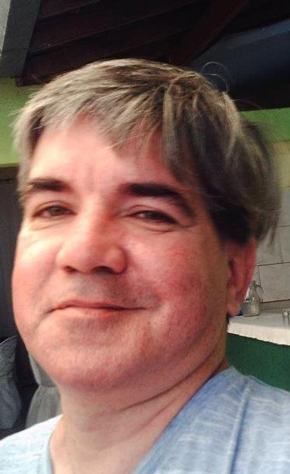Continuing with the coverage of municipal elections, the website The Cape sent questions to all LGBT candidates for councilor in the city of São Paulo. The same questions were sent to the 10 representatives of the gay community who are running for a seat on the city's City Council. Below you can check out the interview with Mario Grego, PSOL candidate.
How did the opportunity arise for you to run for councilor?
My candidacy goes through my history and my activism that began in the 80s, still in the Catholic Church, when I was part of the Movement Against Famine, and then through the Transport Movement in the East Zone, the Committee in Defense of Public Schools in the Zone East, through the Fight for the Public University Movement in the East Zone, which culminated in the implementation of USP Leste, and before that, passing through the São Paulo City Council, working and collaborating in the mandates of former councilors Irede Cardoso (1983-1992) and Tereza Lajolo (1993-1996), and also, having succeeded and being the first citizen in the history of the São Paulo city council to request the revocation of the mandate of two councilors of São Paulo (1999), and for my political activism, moving from the PT (party which I helped to build), and years later I went to PSOL, where I spent years participating, but without party affiliation, thus maintaining a “courtship” with PSOL, considering that I had no intention, at the moment, of running for office. public. I still go through Grupo Corsa, and along with that and in parallel at the same time, I implemented in the City of São Paulo, in Parque do Carmo, a classroom aimed at the gay public and for call girls and boys, with support from the Municipal Secretariat of Health, where he worked as a Prevention Agent. With this background, some friends asked me to apply and had this conversation with me asking for my candidacy, which I was very reluctant to do, but with their help, who, supporting me, insisted on my candidacy, I then decided to apply.
What sets you apart from other candidates?
I am a teacher, 46 years old, born and raised in the São Miguel Paulista neighborhood, east side of São Paulo, where I studied and graduated, having gone to live in Itaquera, but remaining in the São Miguel Paulista region due to the strong roots created since the times of childhood, and only coming to Itaquera on the occasion of my wedding (first gay civil marriage in the city of São Paulo 18/08/2012), where I started to live with my husband, but not even because of the distance did I give up on political activism and my LGBT activism , together with my husband Gledson Perrone Cordeiro, I work to guide many young gays who come to me for advice, so that I can refer them to the Psychology Service, the Social Service, as well as, guiding many people on the most diverse topics in the LGBT world (such as rights civilians, or even in the case of foreign gay people looking for information on how to obtain Brazilian citizenship to live in the country), what I emphasize at this point is that I do not receive government funding, nor from NGOs for the work I do (which is also not disclosed, as this was not the idea). I just fill a role that should belong to the Government.
What are your main proposals?
Not that it is the most important, but it is necessary and urgent to abolish the Municipal Audit Court, a body that contributes nothing to our city, quite the opposite, given the work it performs with just 05 councilors and more of a thousand advisors, the funds they always receive more than that of the mayor, which is the highest salary in the municipality, a body that is between the Legislative and the Executive, which has the function of monitoring and judging, but which does not accept being supervised and judged, also considering that such advisors are of a lifetime nature, and so are their salaries, and that they do not disclose their balances in a clear and explicit manner, and when they do, they do so irregularly through official letters (not attaching copies payslips), and due to the high expense and maintenance of this body, its extinction is necessary.
In the health area, it is necessary and urgent to train professionals: Doctors, Nurses, Technicians and Nursing Assistants, so that they can work better with the LGBTT population that seeks them, as well as implementing them in public health centers, differentiated service hours for this same population, thus avoiding greater prejudice on the part of society (in some SAES in the City of São Paulo this is already done), expanding the specialized network for STDs/Aids, as well as seeking to create public policies for the greater numbers of SAES and CRTS, and greater number of psychologists to serve the LGBTT population in São Paulo.
In education, emphasis on the increase in funds for this area, fighting and proposing the adequacy of the funds allocated to education, proposing changes to the Organic Law of the Municipality, in order to guarantee 31% as a minimum for investment in education, and together with this, the training of all Education professionals, so that they can work with LGBT students within the classrooms, and thus, the issue of homophobia, the rights and duties of each one, including the gay reality, is also addressed, and parallel to this, propose the training of the Metropolitan Civil Guards – GCM – so that the rate of violence against homosexuals can be reduced, and that they know how to respect them as citizens who are just like others. There is no difference between gays and non-gays.
The establishment of a community center for elderly gays in the city, as many are abandoned by their families and partners, and are left alone at the end of their lives, with nowhere to go, who to talk to or what to do. Provide them with adequate medical and psychological support. And, in the same way, a gay community center for gays who are expelled from their homes for admitting their homosexuality, and having nowhere to go, they take to the streets, where they become marginalized, and suffer a little from everything. It is the State's role to comfort and guarantee dignity for these people, at times when they most need help.
Expand the Cads and CRTs in the City of São Paulo, proposing at least one CADS and one CRT in each region of the city, so that the LGBT population of this city can benefit from this service and fight for more public funds to guarantee its operation, as well as overseeing these funds and their investment, charging and monitoring their operation.
How do you intend to help combat homophobic attacks on the streets of São Paulo?
Understanding that it is the Constitutional role and duty of the State to guarantee security, and therefore, increase policing in the city, mainly by mapping the most critical points of attacks on gays on the streets, what is proposed are joint actions with the Military Police and the Metropolitan Civil Guard at such points, in order to at least try to minimize the issue of violence, which in fact, will only happen completely with investment in the education of the population, and in the transformation of students into critical citizens. But while that doesn't happen, I will make my office at Palácio Anchieta available to the entire LGBT population, so that they can forward their complaints, and use the platform to report and monitor (doing it personally every time the need arises). ), thus making the councilor's office, and the Chamber, once again a true interpreter of the popular will.
In your opinion, what is the biggest problem currently facing the LGBT population in São Paulo?
The biggest problem is still the issue of prejudice, which is exercised against LGBTs, when they go looking for jobs, when they go to rent properties and are unable to do so (as they justify that place is a family environment – this happened to me and my husband), the issue of TTs, who suffer much more due to the issue of gender identity (and which few speak about), in the matter of asserting the right to use their social name; medical and psychological care in the city of São Paulo, and much more. I see mainly the issue of security, education and work, which are the ones that should be prioritized the most and, parallel to this, work on the other issues already mentioned. But there is something that no one talks about and that ends up in prejudice: elderly gays.
The candidate did not answer the question “How do you intend to build your political allies?”
To learn more about the municipal elections visit the blog LGBT elections.


